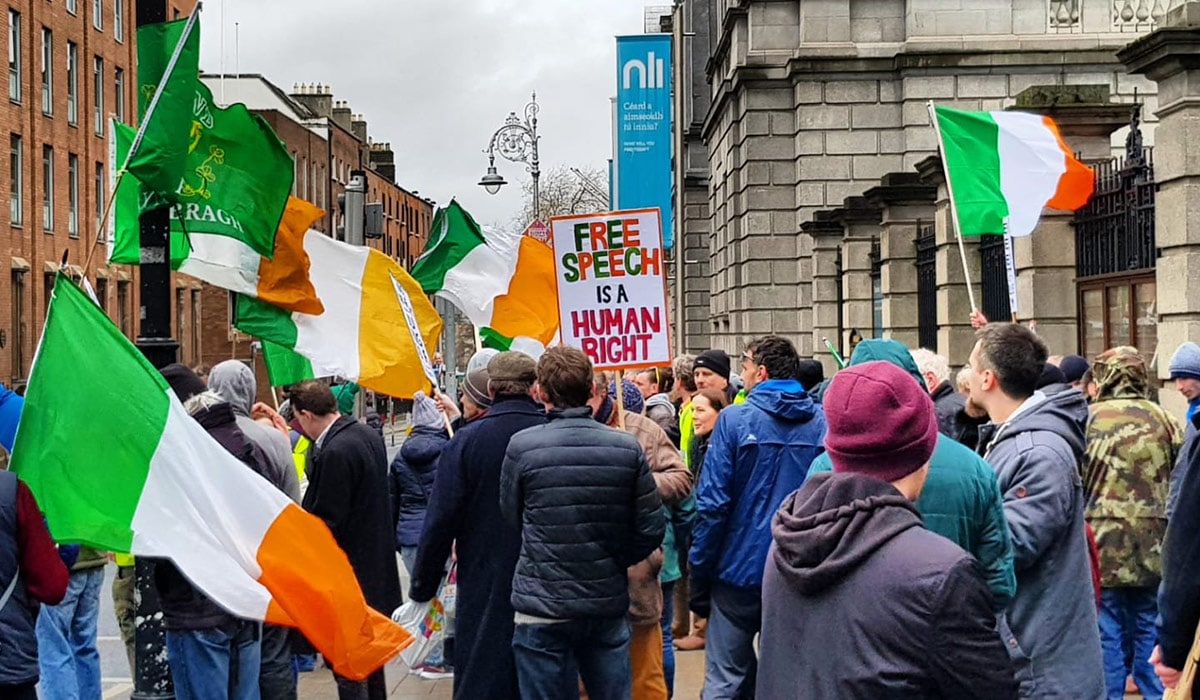A new hate speech bill is being pushed through the Irish parliament despite an initial public consultation revealing an overwhelming number of Irish citizens oppose the controversial reforms to free speech.
Passed through the Dáil, the country’s lower parliamentary chamber last month, the Criminal Justice (Incitement to Violence or Hatred and Hate Offences) Bill 2022 was roundly endorsed across the political spectrum. Parties including Sinn Fein, Labour, the Green Party, Fianna Fáil, and Irish leader Leo Varadkar’s Fine Gael all backed the bill, as it received 110 votes in favor to just 14 against.
However, as is often the case, the popular legislation among politicians is less admired by the electorate and has been widely criticized by huge swathes of the Irish public and free speech advocates.
The bill has also received international condemnation with high-profile opponents including Elon Musk; Donald Trump Jr.; and Canadian scholar Jordan Peterson, a former Harvard University professor.
Why is the bill controversial?
The new hate speech bill will see transgressors sentenced to prison for up to a maximum of five years for falling on the wrong side of a rather subjective line.
The bill intends to “amend the law relating to the prohibition of incitement to violence or hatred against a person, or a group of persons, on account of certain characteristics of the person, or the group,” and labels these protected characteristics as race, color, nationality, religion, national or ethnic origin, descent, gender, sex characteristics, sexual orientation, and disability.
The bill contains several problematic definitions and clauses, not least how it defines gender:
“The gender which a person expresses as the person’s preferred gender, or with which the person identifies, and includes transgender, and a gender other than those of male and female.”
Section 7 of the bill makes it a crime to communicate material to a section of the public or behave in a public place in a manner that is likely to incite violence or hatred against a person or a group of persons on account of their protected characteristics.
One need not intend to incite violence or hatred, but must simply have been “reckless as to whether such violence of hatred is incited.”
Under such a law, it is not beyond the realms of possibility that those debating contemporary issues, such as transgender athletes participating in women’s sporting events or pre-op men serving time in women’s prisons, could be deemed by often militant activists to be inciting hatred towards the transgender community.
The bill provides a defense should the publication represent “a reasonable and genuine contribution to literary, artistic, political, scientific, religious or academic discourse.” However, the burden is on the defendant to prove this and is wholly insufficient, as someone making an important but controversial contribution to a sensitive debate could be dragged through the mud for months and already convicted in the court of public opinion long before being acquitted using such a defense.
Section 10 of the bill is equally problematic. It states a crime will be committed when someone “possesses material that is likely to incite violence or hatred against a person or a group of persons” and it is reasonably assumed that the material was intended to be communicated to the public.
So, even if someone possesses material that hasn’t been published or caused any offense, they can still be sentenced to up to two years imprisonment for holding the material.
Again, a defense that the material was intended for personal use is provided in the legislation; however, once again the burden of proof is on the defendant to show they had no intention of publishing the material and not on the prosecution to show beyond reasonable doubt that the defendant did intend to publish.
How has the Irish public reacted?
Quite understandably, Irish citizens are unimpressed with the legislative reform, to put it mildly. The Department of Justice launched a public consultation into the plans way back in 2019, which received around 3,600 responses.
Irish news outlet Gript looked through all but three of the submissions and reported last week that 73 percent of the responses to the public consultation were negative, some 2,627 submissions.
One such respondent argued that “freedom of expression is much more important than protecting sensitive people’s feelings,” while another said: “I’m offended by the government quite often – but they are entitled to their opinion like I am.” Many appealed to the idea of free speech as a human and constitutional right, while others insisted that governments regulating speech was a common feature of totalitarian countries like China.
On the contrary, just 24 percent of respondents showed support for the bill, while the remaining submissions were either conflicted or too vague to determine which side the respondent was on.
What have others said about the reforms?
“This is a massive attack against freedom of speech,” Elon Musk tweeted last month ahead of the vote in the Dáil, a view endorsed by Canadian professor Jordan Peterson who called on those with their eyes open to “note and heed Elon Musk’s response.”
“It’s insane what’s happening in the ‘free world,'” added Donald Trump Jr.
The Irish Freedom Party, which does not have any representatives in the Irish parliament, has scheduled a free speech rally to take place in Dublin on Saturday in protest against the legislation. In a recent statement, it wrote:
Free speech and equality of all citizens before the law is the basis of free debate and open democratic society. The current government wishes to introduce legislation against free speech and introduce controlled speech curbed by the perceptions and alleged hurt feelings of a person in public.
The Irish Freedom Party believes in free speech. We oppose the granting of certain privileges to specific identity groups selected by the government.
The Free Speech Ireland movement labeled the bill as “an affront to Irish democracy (that) must be stopped.” It launched a petition against the legislation on Tuesday.
The bill is now due to be debated in the Seanad, Ireland’s upper parliamentary chamber, in the coming weeks.





